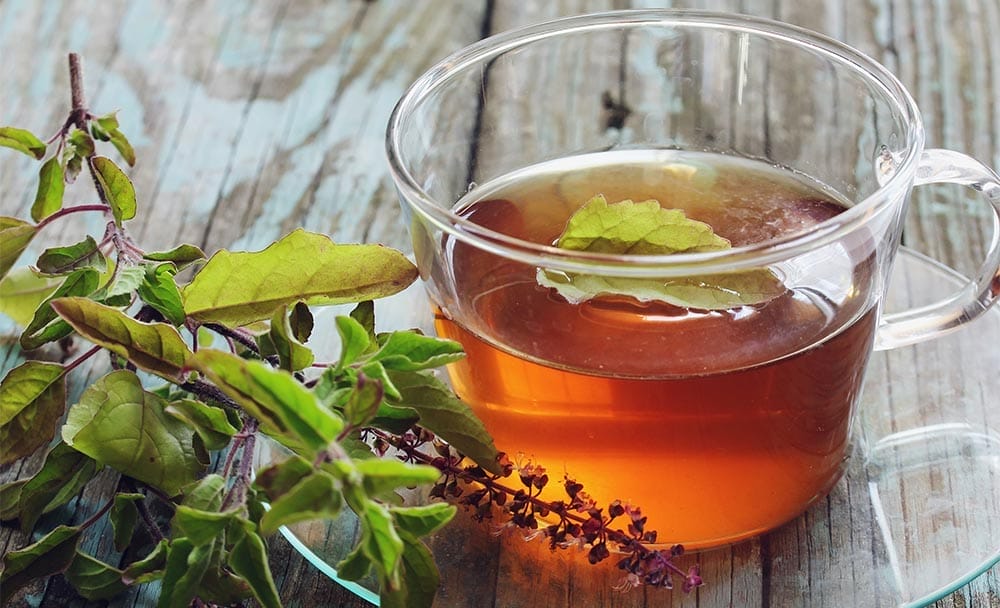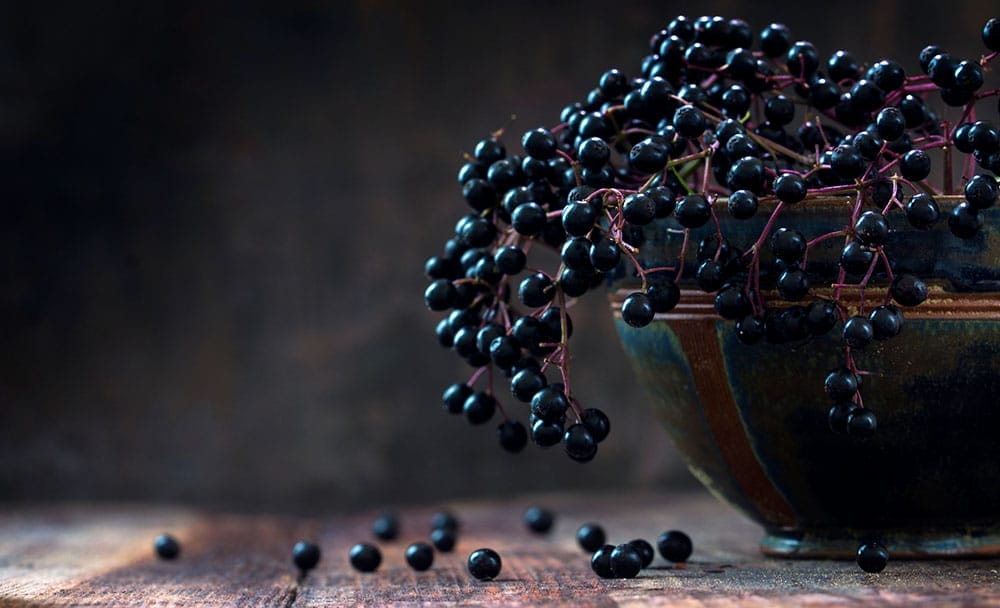शुद्धतायाः रक्षणस्य च प्रतीकः पवित्रः वनस्पतिः तुलसी चिकित्सायाः, भक्तिस्य च कथाः कुहूकुहू करोति
Tulsi, the sacred plant, a symbol of purity and protection, whispers stories of healing and devotion
Tea is regarded as one of the most popular beverages in the world. We all know that tea, or at least non-caffeinated green tea, is good for you. When consumed in moderate amounts, the antioxidants present in tea can help boost the immune system. Now, with the looming threat of COVID-19, our bodies need a stronger defense mechanism, more than ever.
Tulsi berry tea is a tea that is great for battling germs that can threaten to override our bodies’ natural defense systems. As the name suggests, tulsi berry tea consists of both tulsi, or holy basil, and elderberry extract. These two are powerful immune system boosters.
Benefits Of Tulsi
Tulsi is one of the most revered herbs in the Ayurvedic system, with references dating back to about 2600 BC. Known by many names including “The Incomparable One”, tulsi has many benefits both medicinal and spiritual. Almost every Indian home has a Tulsi plant growing indoors, on a patio, or in a courtyard.
A cup of tulsi tea in the evening is almost therapeutic. Its soothing and aromatic smell de-stresses our minds and soothes our nerves.
Tulsi has many benefits:
- Tulsi is rich in vitamins A, C, and K and minerals like calcium, magnesium, phosphorus, iron, and potassium. It also has a good amount of protein and fiber.
- Polyphenols present in tulsi reduce inflammation, improve cellular function, help good microbes while combating bad strains, boost immunity, and reduce cancerous tumors.
- Tulsi increases the T helper cells and natural killer cells activity, boosting the immune system.
- Tulsi reduces the temperature of the body during fevers.
- Eugenol, present in tulsi, reduces the severity of aches in the body.
Benefits Of Elderberry
Elderberry is the less famous cousin of the popular blueberry. It is one of the most commonly used medicinal plants in the world and has been used to treat colds and flu for thousands of years. Elderberries are often used in jams, tinctures, syrups, and tea.
Elderberry has many benefits:
- It contains several minerals, dietary fiber, fat, and proteins.
- It is high in vitamin C, which combats the severity of cold and flu, amongst other illnesses.
- It is high in dietary fiber which aids in digestion.
- It is a good source of phenolic acids which work as antioxidants that prevent cellular damage due to free-radical oxidation reactions.
- It is a good source of flavonols, which act as antioxidants, and anti-inflammatory agents, and have anticancer factors.
- It is rich in anthocyanins that help reduce inflammation and have antiviral and anticancer benefits.
How to Make Tulsi Berry Tea?
- Add 3 tablespoons of elderberry and 3 cups of water to a pot. Bring the water to a boil, then reduce the heat and simmer for half an hour.
- Add tulsi and basil leaves in the decocted elderberry concentration.
- Remove the tea’s plant material by straining it.
- You can add honey for a sweet flavor. Make sure to mix well.
Possible Side Effects of Tulsi Berry Tea
When including tulsi tea into your diet for the first time, some people feel nausea or diarrhea; therefore, it’s advisable to start small and gradually increase your consumption. When using tulsi in combination with blood-sugar-lowering medication, those with diabetes should exercise caution since it may drop blood sugar.
Why Should We Consume Tulsi Berry Tea?
In combination, tulsi and elderberry make one of the most effective pathogen-fighting teams and support immune function. For some, the flavour of tulsi tea is too intense by itself. Likewise, elderberries are usually too tart or bitter to be eaten raw and can cause stomach upset and intestinal issues. Tulsi elderberry tea offers the perfect solution by muting the effects of both sides while retaining the benefits. The tea is also usually made in combination with many warming herbs used in Ayurveda – cinnamon, cardamom, clove, ginger, black pepper, and other berries such as blueberry and boysenberry, making for a much sweeter experience.
Tulsi is native to Southeastern Asia and has been traditionally used in India for centuries as a medicinal plant. Elderberry meanwhile is less known in the Eastern sphere. Still, it is a common European folk remedy and was used by the ancient Egyptians and Native Americans to treat a variety of illnesses. This makes tulsi berry tea the perfect blend of East and West.
The Takeaway
Having a cup of tea every day is a simple habit that can be cultivated and which can improve our lives by leaps and bounds. Most varieties of tulsi berry tea are available on the market or online. Curling up with a cup of your favorite brew is a pleasurable way to pass the evening. Make it part of your daily ritual – you won’t regret it.
FAQs
- How effective is Tulsi Berry Tea?
Tulsi Berry Tea contains both elderberry extract and tulsi, also known as holy basil, as the name would imply. Both of these are potent immune system enhancers. Tea made from tulsi berries is an excellent way to combat bacteria that could undermine our bodies’ natural defense mechanisms.
- Does Tulsi Berry Tea make you tired?
Tulsi has been used for generations as a sleep aid and to promote calm. It is, in a nutshell, the sleep aid tea you were unaware of! Additionally, it might have potent anti-inflammatory properties
- Does Tulsi help with anxiety?
For thousands of years, people have used the herb tulsi, sometimes known as holy basil, for its therapeutic and sedative qualities. The plant can help with anxiety and mood fluctuations. Tulsi’s rosmarinic acid is a potent anxiolytic, meaning it reduces anxiety.
Beat The Heat With Healthy Ayurvedic Beverages (Download Ebook)
References:
- https://pubmed.ncbi.nlm.nih.gov/17726576/
- https://pubmed.ncbi.nlm.nih.gov/31031748/
- https://www.ncbi.nlm.nih.gov/pmc/articles/PMC3249909/
- https://www.researchgate.net/publication/329144207_OCIMUM_SANCTUM_A_MEDICINAL_GIFT_FROM_NATURE
- https://pubmed.ncbi.nlm.nih.gov/16170979/
- https://www.sciencedirect.com/science/article/pii/S1756464614002400
- https://www.sciencedirect.com/science/article/pii/S1756464614002400
- http://www.ijcea.org/papers/416-N0002.pdf
- https://www.sciencedirect.com/science/article/pii/S1756464614002400
- https://www.ncbi.nlm.nih.gov/pubmed/22129334
- https://pubmed.ncbi.nlm.nih.gov/17726576/
- https://pubmed.ncbi.nlm.nih.gov/31031748/
- https://www.ncbi.nlm.nih.gov/pmc/articles/PMC3249909/
- https://www.researchgate.net/publication/329144207_OCIMUM_SANCTUM_A_MEDICINAL_GIFT_FROM_NATURE
- https://pubmed.ncbi.nlm.nih.gov/16170979/
- https://www.sciencedirect.com/science/article/pii/S1756464614002400
- http://www.ijcea.org/papers/416-N0002.pdf
- https://www.ncbi.nlm.nih.gov/pubmed/22129334




















